Understand the strengths and weaknesses in your writing, and you can become your own teacher and improve your writing skills.
This article discusses how to spot and fix the following 8 writing weaknesses:
1. Boring your readers
2. Lack of focus
3. Lack of substance
4. Dodgy flow
5. Long-winded sentences
6. Gobbledygook and misplaced jargon
7. Fluff
8. A bad sense of rhythm
![]()
Writing strengths and weaknesses

Do you ever read your content and wonder …
Why is this not better?
But then you struggle to decide what’s actually wrong?
Being your own writing teacher can feel like a tough task.
After sweating over your draft, you need to decide what’s good and what needs improving. It’s a matter of tough love for your favorite sentences and precious words. You have to scrap sections and scrub off the dirt to communicate your message with power.
But how can you spot your writing weaknesses so you can let your words shine?
Become your own writing teacher
Remember your favorite teacher from high school?
Be as kind as she was, and tell yourself what you’re doing well already. Perhaps you write fantastic openings, or your word choice is excellent, or you share super-valuable tips and have a wealth of experience to draw from. Remember to celebrate these writing strengths.
As a good teacher, you can’t be negative about your own progress. It’s your task to spot your weaknesses, but also to encourage yourself to embrace your learning and have fun.
Want to write better? Get my best writing tips for business here > > >
- Understand what makes writing good—you can do this by creating your own swipe file
- Learn to spot the weaknesses in your writing—I’ve listed the most common weaknesses below
- Practice fixing your weaknesses—that’s how your content improves
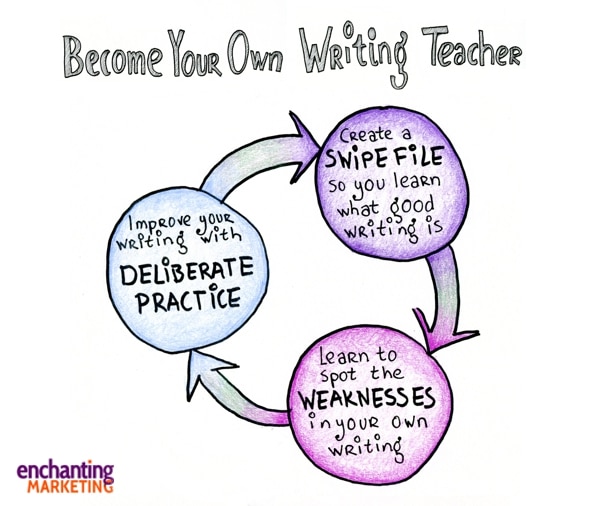
Additional reading to become your own writing teacher:
Create a swipe file to learn the keys to good writing
The 4 principles of deliberate practice to accelerate your learning
Trying to solve all problems in one go creates a learning experience from hell.
To make learning how to write more fun, address weaknesses one by one. The list below is in order of importance.
Ready to explore?
Writing weakness #1: You’re boring your readers to tears
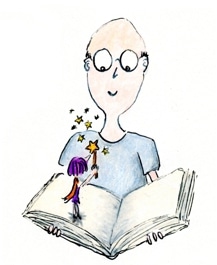 When writing we can’t see our readers.
When writing we can’t see our readers.
So, it’s easy to forget who they are, and write as if lecturing a faceless crowd.
But writing isn’t a monologue. We write to communicate with our readers. And when we write to educate, entertain and inspire, no content is boring.
How to spot whether you’re boring your readers:
If you feel bored writing your content, then this is a sign something isn’t working. Have you lost your mojo? Have you lost your connection to an (imaginary) reader?
Or perhaps you don’t know who your ideal reader is or you don’t like them?
How to turn this common weakness into a strength:
- Describe the person you’re writing for—it can be a real or imaginary person
- Write down in one sentence which specific problem your content solves
Remember, when our writing eases our reader’s pain, solves their struggles and improves their lives, our content can not be boring.
Writing weakness #2: Lack of focus
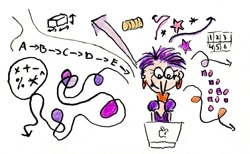 It’s a common misunderstanding that content has to be comprehensive to be good.
It’s a common misunderstanding that content has to be comprehensive to be good.
But, think about your readers … how many of them feel overwhelmed? And would they prefer one valuable tip to improve their life or an in-depth bible with all do’s and don’ts?
As writers, we often feel insecure. We think we’re not good enough. We wonder what we can do to make our content better, more valuable, and more extensive. We want to write THE definitive guide.
But the idea that longer content is always better is wrong. The task of a writer is not to be more comprehensive, but to communicate a message and inspire a reader to take action—to implement their advice or to buy a product if it’s right for them.
How to spot this weakness in your writing:
Can you distill the essence of your content in one sentence?
If you can’t, try this exercise:
- Write down in one sentence which problem your content solves
- Define in one sentence the “sunny destination” of your content: how does your content make your reader’s life better?
Remember, your content makes an impact when it makes your reader’s life better—even if the improvement is tiny.
Writing weakness #3: Lack of substance
 Substance goes hand in hand with having a clear focus in your content.
Substance goes hand in hand with having a clear focus in your content.
Instead of an article sprawling out into multiple directions, focus on one specific topic and add more depth to your argument. For instance, a personal story adds depth because it can illustrate how you’ve benefited from your tips; and statistics or research results help back up your arguments.
How to spot whether your writing lacks substance:
Does your content remain abstract or superficial? Have you given examples to make your advice concrete? And if you’re writing sales copy, do you communicate both benefits and features?
- A personal story, examples or case studies to illustrate your key point
- A metaphor to make your point crystal-clear
- Research results to back up your story with facts
- Quotes from experts or testimonials to put the spotlight on your key point
- Common mistakes your readers should avoid
- Answers to questions readers are dithering about
- Suggestions on overcoming hurdles that may block readers from implementing your advice
- Drawings or graphs to add comprehension
Remember, substance is about the depth of your arguments, not about the length of your article. It’s about the insight you offer your readers. Even an email of 100 words can have substance. A nugget of wisdom. A super-practical tip. A spark of inspiration.
To write substantial content, first find focus, then add substance.
Further reading on writing with substance:
>> 8 tips to write fascinating articles with substance
>> How I turned 31 measly words into a valuable blog post [case study]
Writing weakness #4: Dodgy flow
 Content that flows pulls readers smoothly from the first to the last word, without hiccups and hurdles. It’s about the logical arrangement of information and stories.
Content that flows pulls readers smoothly from the first to the last word, without hiccups and hurdles. It’s about the logical arrangement of information and stories.
An easy way to think about flow is to imagine yourself having a conversation with your ideal reader. Are you taking your reader by the hand and explain a problem step by step? Does your sales page answer the questions when they come up in their mind?
A sales page often follows this structure:
- What’s this page about—what problem does your product solve?
- What exactly does the product or service do and why does it matter to buyers?
- How does it work?
- How do buyers know you’re legit?
- What exactly is the deal?
- How to buy?
If you’re unsure where to place content, ask yourself: When would my reader ask this?
Blog posts work in a similar way. Start with the most important information:
- Why would the reader care about your tips in a post? What problem does your article solve?
- How exactly do readers solve this problem?
- How do readers overcome hurdles to implement your advice?
How to spot a lack of flow in your writing:
Read your content at a decent pace to determine the flow. When you read fast enough you’re not bogged down by details and it becomes easier to grasp the big picture:
- For every section, write down which question the content answers (or alternatively, summarize in one bullet point)
- Read through the questions or bullet points—do they feel logical or can you re-arrange them in a logical order? Can you skip any sections?
Further reading on content flow:
Writing weakness #5: Long-winded sentences
 Do you find my content easy to read?
Do you find my content easy to read?
My trick is to keep my sentences short.
At school, you may have been taught to write long, impressive sentences. But shorter sentences are easier to consume and make your content more accessible to all.
How to spot long-windedness in your writing:
- The Hemingway app (the online version is free) highlights long and very long sentences in your writing
- Microsoft Word provides readability stats, including your average sentence length
- Several other online tools measure readability stats, too
To reduce your average sentence length, chop the longest sentences in two or three. Communicate one tiny idea in each sentence, and ensure each sentence follows the previous one logically—don’t jump ahead as you may lose your reader.
Your aim is not to make every sentence as short as possible. That’s monotonous and tiring to read. So, vary long and short sentences, and try keeping your average sentence length to 14 words max. An occasional long or very long sentence is fine.
Further reading on writing good sentences:
>> How to write a sparkling sentence
>> How to write like Hemingway
Writing weakness #6: Gobbledygook and jargon
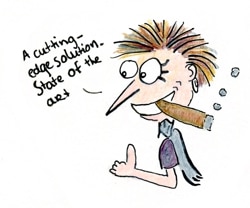 In marketing, gobbledygook refers to catchphrases so overused they’ve lost their meaning. And jargon are words only insiders know.
In marketing, gobbledygook refers to catchphrases so overused they’ve lost their meaning. And jargon are words only insiders know.
Gobbledygook is always wrong because they make your content sound hyped up. In contrast, jargon can be fine—as long as your readers understand your words.
How to spot jargon and gobbledygook in your writing:
- Would you use the word in a face-to-face conversation with your ideal reader?
- When you read out your content, does it sound like you?
- Do you write to clarify or to impress?
Gobbledygook and jargon sneak into our writing when we forget who we are, when we forget why we’re in business (to help!), and when we write for a faceless crowd rather than our favorite clients. So, imagine yourself in a cozy cafe with your favorite client, and use only the words you’d use while drinking a beer together.
Further reading on gobbledygook:
Writing weakness #7: Fluff
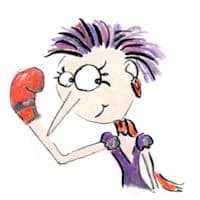 Meaningless words are fluff—they weaken the impact of your writing. It’s like adding water to wine. Brrr. Shiver.
Meaningless words are fluff—they weaken the impact of your writing. It’s like adding water to wine. Brrr. Shiver.
Fluffy words are phrases like very, actual, in my opinion, really, just. But also verbs like to make, to provide, and to add. These words are fluffy because you can’t visualize them.
When you scrap meaningless words and focus on powerful phrases, your content becomes more concise and your message becomes clearer. Like good wine, it engages all senses.
How to spot fluff in your writing:
The key trick to getting rid of fluff is counter-intuitive: Focus on meaningful words first. Then try to rewrite each sentence with as few weak phrases as possible. (Here’s more detail about this technique)
Many words have some meaning, but aren’t particularly strong. So don’t fret too long whether a word is meaningful or not. Go with your gut feeling; it’s not an exact science.
Further reading on cutting the fluff:
>> 4 types of weak words to eliminate from your writing
>> How to write concise sentences
Weakness #8: A bad sense of rhythm
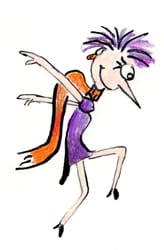 Rhythm is one of the most underrated aspects of writing.
Rhythm is one of the most underrated aspects of writing.
But readers can sense the rhythm in your writing—just like music can guide your workout rate. Even when people aren’t reading your copy aloud, they can hear its rhythm because they listen to their inner speech.
A good rhythm makes a reading experience more pleasurable.
How to spot whether your content lacks rhythm:
Read your copy aloud (or use an app to read the content to you) and listen to its rhythm—do you speed up and slow down? Do you have natural pauses?
To make your rhythm more pleasurable:
- Vary sentence length—mix long and short sentences, and try a few ultra-short sentences
- Pay attention to transition words—such as but, and, in contrast, for example—so readers go smoothly from one sentence to the next
Further reading on rhythm:
>> Rhythm in writing: How to make your words swing and swirl
How to become your own writing teacher
Let’s not pussyfoot around it.
Improving your own writing is a challenge.
When you don’t have a teacher to cheer you on, it’s easy to feel down and worry you’ll never be good enough.
So, remember to stop negative self-talk, and cheer yourself on instead. Your writing journey should be fun.
Focus on one weakness at a time. Start at the top of this list, and work your way down—tackle the weaknesses one by one.
Embrace your learning experience.
Treasure your writing moments.
And remember how lucky you are to have time to write and improve your skills.
![]()
Recommended reading on fixing writing weaknesses:
4 proven principles to practice your writing
How pro writers create a swipe file to improve their skills
The 5-step revision process to edit rough drafts
You may also like:
29 ways to improve your writing skills (the essential list)


Thanks for explaining the weaknesses so lucidly. I now have a clearcut idea of how to go ahead with improving my writing. It’s always a pleasure reading your thoughtful and well-written blog posts. Thanks a lot, Henneke!
That sounds good. Happy writing, Devi!
Fantastic information. Thanks. I needed this because I’m constantly looking for ways to improve my writing.
I’m glad this was useful, Suzana. Happy writing!
I think that emails have become the curse of the English language. They are easy to misinterpret and often suffer from the many mistakes you have identified. Why say 100 words when 10 will suffice. I found your tips very useful and they will help me to think before I press the SEND button. Thank you
Yes, email has made us lazy. So often, we dash of a quick email rather than consider why we’re sending the email and edit our writing accordingly. I’m glad you’re enjoying my tips.
Hi Henneke
Enjoyed this article…very helpful and informative. Loved the tips. Keep them coming!
Thank you, Leena. Happy writing!
thanks for your your great and amazing tips!!!
Happy writing, Jaqueline!
Hey Henneke, you are such a great writer. Your articles are very helpful and easy to digest. Every single heading has meaningful insights. You sound like a polite teacher students love to learn from.
What a lovely compliment. Thank you, Kulsoom. Happy writing!
Hi Henneke,
I enjoyed reading your blog on the 8 weaknesses in your writing and how to fix them. I always felt that less was more in writing. You need to get to the point with as few words as possible, as much as possible to eliminate boredom. I will incorporate these 8 tips to help improve my writing skills.
Thank you, David, and yes, I agree—less is more and that can feel like a tricky skill to master.
Hi Henneke,
Epic Post. Salute to your idea..”Becoming your own writing teacher”. I can see my writing weaknesses vividly now. 🙂
There’s magic in your writing. That enriching & grounding my writing journey. I try to re-read your every post until I grasp fully. Never get bored.
Your honesty brings clarity in your writing. And allows words to shimmer. I feel it.
Loads of thanks.
Thank you, Mehera for your lovely comment.
Happy writing!
While I believe that I suffer from all of these, the hardest for me to identify is whether I am boring my readers or not. I tend to be able to entertain myself in my writing as I mostly write about myself! I like the idea that you can be your own writing teacher. With a little bit of time, hard work and focus we can all take away so much from this wonderfully insightful article. Thank you for sharing your expertise!
Even when you write about yourself, you can still address your readers and think about what’s in it for them. Usually, when we write about ourselves, our readers can learn from the processes we’ve been through and the mistakes we’ve made.
Happy writing, Patrick!
Hi Henneke,
Lack of focus is what I struggle with.
I’m the one that’s always trying to come up with the definitive guide when I can easily just write one great post on one point. I’ve even been told that when I tried to submit a guest post to a site and the person suggested to focus on one main point.
Lesson learned.
Great post once again. Have a great day.
– Andrew
Focus can feel hard to achieve, especially when we feel under pressure to write an “epic blog post” or “skyscraper content.”
A lot of people suggest we need to be definitive and write longer posts so there’s a lot of incentive to cram as much as we can into a post. I’ve been there, too.
Happy writing, Andrew. And thank you for stopping by!
This is a really amazing post for every writer out there. Indeed, the points mention are the big reasons for weak writing. It actually helps me a lot in identifying my style of writing.
Thank You, Henneke, for sharing it with us. And yes, I liked the graphics with every point.
Thank you for your comment, Rahul. I’m glad you like both the tips and the graphics.
Happy writing!
Great actionable article Henneke! Lots of information to put into practice right away.
You mentioned a concern about putting too much substance is this article. A small suggestion from Backlinko – in longer articles, a table of contents with clickable links helps both with navigation and understanding the overall structure. It’s such an excellent resource, a downloadable PDF would be fantastic.
Thanks for this incredibly helpful post!
Yes, I can see a PDF would be useful. I guess it’s just laziness on my side. I also don’t like to ask people to sign-up so they can download a PDF, so I’d only do it as an extra service to readers. Maybe I should …
I’ve thought about creating a table of contents, but I’m not quite sure I like it as it doesn’t encourage people to read the post—the items may seem random, but they follow each other in a logical order. I have used tables of contents on my content overview pages, so people can find the most relevant content for them; in such a case, I think it’s useful.
Thank you for your suggestions, Faye. Food for thought!
Hi great article. I am just starting to write a blog and this sort of information ensures I will not write a boring piece.
Thank you.
Great! Happy writing, Roger.
Lovely tips for working around fluff. Fluff is definitely a problem that, unfortunately, muddies much of the work I do. Keep it up! 🙂
Thank you, Barry. Keep up the fight against fluff! 🙂
You make it sound so simple and attainable. I like the part about improving step by step, you’re an encouraging teacher. Bless you, H.
Somehow writing is both simple and hard. The principles are simple, but implementing them can feel hard and it’s easy to feel down when content doesn’t turn out like we had originally envisioned it (it still happens to me all the time).
Take it easy on your writing journey. Good writing is definitely attainable as long as we learn step by step. Happy writing!
Henneke, you continue to be my in situ writing teacher and to run my favourite writing blog! I was glued to every sentence as I’ve been searching for just this kind of advice for some time now. While I’m, on the whole, happy with my writing, I know that it needs to improve. This will definitely help me to do that.
You made my day, Matthew. I’m so glad this was just the advice you were looking for. Happy writing, and thank you for stopping by. I appreciate it 🙂
I love this blog! After reading it, I felt like I just had a good wholesome dinner. As a newbie writer/blogger, I am going to use your tips and helps step by step to learn and grow as a writer.
And I love your drawings too!
Thanks for all the helpful information.
Meralyn
Thank you so much for your lovely comment, Meralyn. I’m glad you enjoyed this post.
Happy writing!
You are good at what you do Henneke.
This post came at the most opportune time for me. I have been having this feeling that my writing needs something fresh to enliven it. I wasn’t feeling it anymore. I hate to submit to a client something I don’t even enjoy reading myself.
And then this article pops up in my inbox. Suddenly it’s all clear. I just need to clean up my writing. Somehow I have let a lot of bad habits build up and the quality of my writing dropped as a result.
This will definitely help.
Thanks for sharing.
It can be extra tough when you’re writing for clients and when perhaps the topics you’re writing about aren’t the ones you’d choose yourself. When I was still writing for clients, some topics seemed utterly boring at first, but by imagining who might be interested in it, I often could get more excited about a topic (and produce better content0.
Happy writing, Patrick, and thank you for stopping by.
Henneke,
While I always look forward to your emails, I believe that this one is my favorite. You cover eight topics quite well, while creating the “flow” you write about. All important stuff for writers, and presented like an info feast!
Great job,
Bill
Oh my, that’s a big compliment. Thank you so much, Bill. I love your phrase “info feast.”
And silly me was worried that I had crammed too much into this post!
Oh, wow, Henneke, I just read a post aloud to my husband the other day, because I thought he’d like it. However, the more I read, the more I did not like it! I was so shocked. It was not good.
This post of yours should be just what I need to fix! Thanks so much. I’ve been a bit scared to post any more since that episode!
Oh my, you shouldn’t be scared to post! When you read it aloud and don’t like it, try to figure out why you don’t like it and then post it.
It’s fascinating how reading something aloud can change our perspective, isn’t it?
I know. I ‘m not really scared to post, but just hesitant, not trusting my ear while I’m writing. And yes, that read-aloud moment surely taught me a thing or two!
I think what’s wrong is that I am mostly a pencil writer and when I take to the keyboard, I make garbage; it’s some kind of disconnect with my core, as if my brain is writing but my heart is elsewhere.
That, and I broke almost every rule you listed above! 😀
I’m going to print that yuk post, double-spaced, and attack it with a pencil while on vacation, soon, thanks to you. 🙂
That’s an interesting point you make about “not trusting your ear while writing.” This makes me realize I don’t really trust my ear either–at least not when I am writing my first draft. I use the revision and editing phases to make the writing feel more like me—something I’m happy with.
I need to think about heart vs brain. I think it’s always a balance for me, but I’m not sure. And, of course, we’re all different in our writing process, so what works for me doesn’t necessarily work for you.
Happy revising!
Hey Henneke,
Boredom is a big weakness! Yes it occurs when we ourselves are bored with our writing. Losing the mojo can happen to anyone. But spotting it right away to avoid the same from conquering the writing is the key.
Following a very strict pattern, or working on publishing the same type of content can cause boredom too!
Just like readers, writers do become bored with a strict pattern.
Fluff = adding water to wine. Yes!
Thanks for sharing this awesome piece 🙂
Cheers,
Jane.
Yes, so true. Everyone can lose their mojo, and it can be hard work to get it back.
Thank you for stopping buy again, Jane. I appreciate it.
Happy writing!
Hey Henneke,
Great post, as always. 🙂
I will definitely be having all these in mind on all of my future posts.
One writing tip I love is about the word “that”. It’s totally overused. Have you noticed?
I try not to use it when it doesn’t need to be included in a sentence. For example:
Instead of this… I’m going to show you everything that you need…
You’d go with this… I’m going to show you everything you need…
It gives your writing a better flow.
Anyway, I’m looking forward to your next post. And thanks for all the advice.
Cheers,
Julian
Yes, that’s a good tip!
I cross out many “that’s” in my draft posts, but it could be that some “that’s” still sneak in 😉
Thank you for stopping by, Julian. Happy writing!
Great Post Madam. Thanks for sharing. May God bless you.
Thank you, Dhaya. Happy writing!
I just looked at two drafts I did last week and I had lots of lackluster writing. I revised with your suggestions and I do believe they are better now! Thanks.
Yay! Reading this makes me happy. Thank you, Kathy.
One thing you will never be accused of, Henneke, is a lack of substance. Your posts are always chock-full of great tips and visuals. 🙂 Thanks for another super post.
To be honest, I was a little worried that there might be too much substance in this post, but it seemed like a useful overview so I went ahead to publish it anyway (and I’m glad I did).
Thank you for your encouragement, Cathy!
Hey! I laughed out loud at Henrietta with the cigar doing the “sham-wow” sales pitch. 😉 I’ve been paying a lot more attention to specific detail in both my reading, writing, and teaching, and it really is a game-changer in so many ways. It differentiates the level of mastery. Thanks for all you do!
And thank you for being you, and for being such a loyal reader and commenter.
I remember you once teaching me the word “sham-wow” 🙂
Your articles always give me 100% boost to my skills 🙂
Consider yourself a copy doctor? You should.
Thank you so much for your compliment, Wojtek. I appreciate it. Happy writing!
Hi Henneke,
Before this landed in my inbox, I had been swirling in my pits of misery and doom, thinking why I ever thought I could write. Your post is not only timely, but amazing! Thank you so much for telling us to knock of the negativity, pull up our socks and work on our weaknesses.
Great tips 😀
Much love from India!
Oh my, I’m sorry you were swirling in pits of misery and doom.
Learning to write can feel like a lonely struggle. Please don’t give up, Vinita, and celebrate your successes—congratulate yourself for each a piece of writing you finish. Happy writing!
You couldn’t say it better, if I enjoy writing, my readers will enjoy reading- what an awesome test.
And, also, here onwards, I commit to focus on writing only and only to clarify and not to impress.
Happy writing, Hena. Thank you for your lovely comment. I like your commitment to writing for clarity, not to impress. 🙂
Hi Henneke,
brilliant article. You give so much.
I know I probably sound ridiculously lazy, but this is all so much work. I love the idea of deliberate practice, but find it almost impossible to set myself the problems, so I can practice later. Why is there no app for deliberate practice for writers? Surely I can’t be the only one that would be happy to pay for such a thing.
It doesn’t sound lazy at all, we all have to set our own priorities and we can’t do everything. You’re absolutely right: writing and improving our writing skills IS a lot of work. It’s just like with learning to play the piano or tennis—you have to practice a lot.
Hi Henneke! 🙂
Missed your posts, and this one is a beauty! I think I now need to rearrange my list of top 3 of your favorite posts. Super useful and actionable, and I love the drawings, too (I didn’t know Henrietta smoked cigars! ;D)
Can’t wait to spread the word!
Thank you so much, Gill. I’m glad you like this one 🙂 In your top 3 of my posts?
That’s a big compliment!
PS Henrietta seems to only smoke cigars when she’s impersonating a sleazy sales person 😉
Hi Henneke,
What an insightful post. I make all of these mistakes and until you pointed them out I was probably unaware – thanks. The last one was quite surprising but logical. I will pay more attention to that in the future.
Also, this trick for the overused words and sentences made me laugh out loud “Would you use the word in a face-to-face conversation with your ideal reader?”.
It sounds like you could perhaps be a bit kinder to yourself and more upbeat about your writing skills? You’re publishing your first book!
hahahah yes! This cracked me up, it’s something my sister would say to me in that tone. Also, I am writing a personalized email with lots of sugar to my backers so expect a “dessert” in your inbox soon 😉
I’m looking forward to dessert 🙂